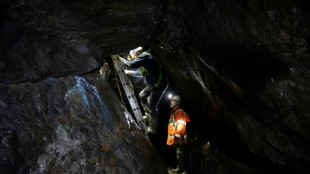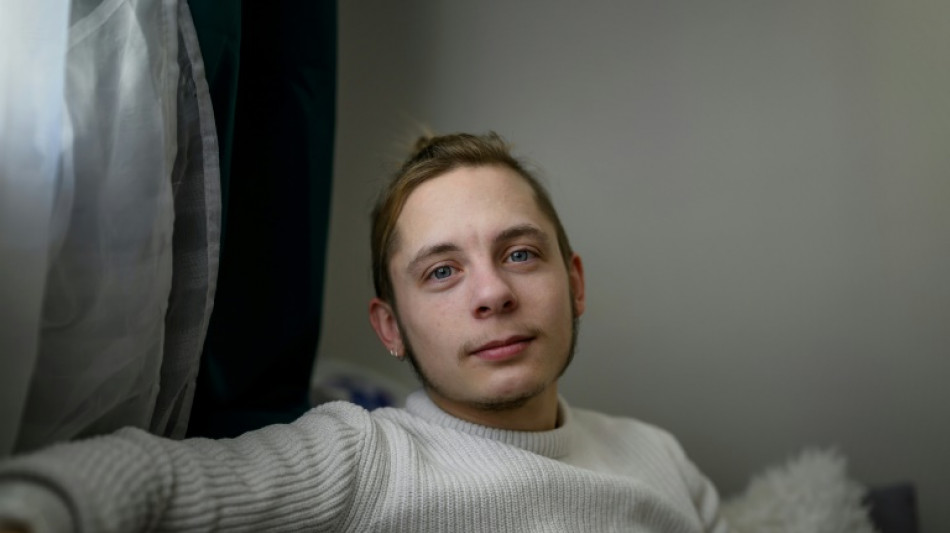
-
 Zuckerberg denies Meta bought rivals to conquer them
Zuckerberg denies Meta bought rivals to conquer them
-
Starc stars as Delhi beat Rajasthan in Super Over

-
 Weinstein asks to sleep in hospital, citing prison 'mistreatment'
Weinstein asks to sleep in hospital, citing prison 'mistreatment'
-
Amorim asks McIlroy to bring Masters magic to Man Utd

-
 Ruud keeps Barcelona Open defence on course
Ruud keeps Barcelona Open defence on course
-
Trump tariffs could put US Fed in a bind, Powell warns

-
 CONCACAF chief rejects 64-team World Cup plan for 2030
CONCACAF chief rejects 64-team World Cup plan for 2030
-
Putin praises Musk, compares him to Soviet space hero

-
 Son to miss Spurs' Europa League trip to Frankfurt
Son to miss Spurs' Europa League trip to Frankfurt
-
US senator in El Salvador seeking release of wrongly deported migrant

-
 Trump tariffs could put the US Fed in a bind, Powell warns
Trump tariffs could put the US Fed in a bind, Powell warns
-
US judge says 'probable cause' to hold Trump admin in contempt

-
 India opposition slams graft charges against Gandhis
India opposition slams graft charges against Gandhis
-
Nate Bargatze to host Emmys: organizers

-
 US Fed Chair warns of 'tension' between employment, inflation goals
US Fed Chair warns of 'tension' between employment, inflation goals
-
Trump touts trade talks, China calls out tariff 'blackmail'

-
 US judge says 'probable cause' to hold govt in contempt over deportations
US judge says 'probable cause' to hold govt in contempt over deportations
-
US eliminates unit countering foreign disinformation

-
 Germany sees 'worrying' record dry spell in early 2025
Germany sees 'worrying' record dry spell in early 2025
-
Israel says 30 percent of Gaza turned into buffer zone

-
 TikTok tests letting users add informative 'Footnotes'
TikTok tests letting users add informative 'Footnotes'
-
Global uncertainty will 'certainly' hit growth: World Bank president

-
 EU lists seven 'safe' countries of origin, tightening asylum rules
EU lists seven 'safe' countries of origin, tightening asylum rules
-
Chelsea fans must 'trust' the process despite blip, says Maresca

-
 Rebel rival government in Sudan 'not the answer': UK
Rebel rival government in Sudan 'not the answer': UK
-
Prague zoo breeds near-extinct Brazilian mergansers

-
 Macron to meet Rubio, Witkoff amid transatlantic tensions
Macron to meet Rubio, Witkoff amid transatlantic tensions
-
WTO chief says 'very concerned' as tariffs cut into global trade

-
 Sports bodies have 'no excuses' on trans rules after court ruling: campaigners
Sports bodies have 'no excuses' on trans rules after court ruling: campaigners
-
Zverev joins Shelton in Munich ATP quarters

-
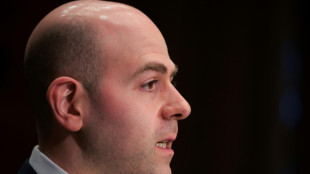 The Trump adviser who wants to rewrite the global financial system
The Trump adviser who wants to rewrite the global financial system
-
US senator travels to El Salvador over wrongly deported migrant

-
 UN watchdog chief says Iran 'not far' from nuclear bomb
UN watchdog chief says Iran 'not far' from nuclear bomb
-
Trump says 'joke' Harvard should be stripped of funds

-
 Macron vows punishment for French prison attackers
Macron vows punishment for French prison attackers
-
Canada central bank holds interest rate steady amid tariffs chaos
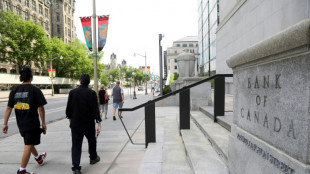
-
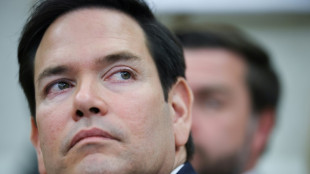 Rubio headed to Paris for Ukraine war talks
Rubio headed to Paris for Ukraine war talks
-
Australian PM vows not to bow to Trump on national interest

-
 New attacks target France prison guard cars, home
New attacks target France prison guard cars, home
-
Global trade uncertainty could have 'severe negative consequences': WTO chief
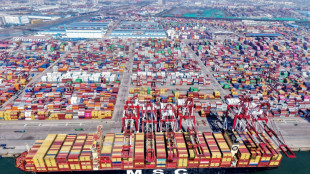
-
 Google facing £5 bn UK lawsuit over ad searches: firms
Google facing £5 bn UK lawsuit over ad searches: firms
-
Onana to return in goal for Man Utd against Lyon: Amorim

-
 Tiktok bans user behind Gisele Pelicot 'starter kit' meme
Tiktok bans user behind Gisele Pelicot 'starter kit' meme
-
'Put it on': Dutch drive for bike helmets
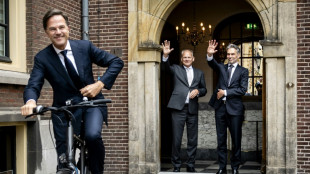
-
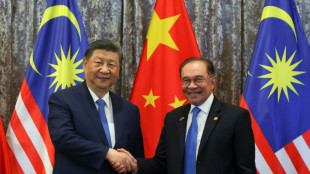 China's Xi meets Malaysian leaders, vows to 'safeguard' Asia allies
China's Xi meets Malaysian leaders, vows to 'safeguard' Asia allies
-
France urges release of jailed Russian journalists who covered Navalny

-
 Gabon striker Boupendza dies after 11th floor fall
Gabon striker Boupendza dies after 11th floor fall
-
UK top court rules definition of 'woman' based on sex at birth
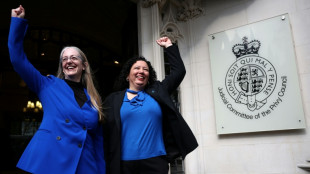
-
 PSG keep Champions League bid alive, despite old ghosts reappearing
PSG keep Champions League bid alive, despite old ghosts reappearing
-
Stocks retreat as US hits Nvidia chip export to China
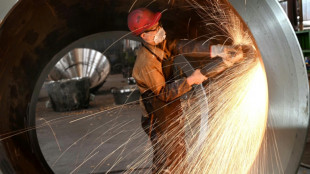

Insults and acceptance: being trans in rural France
Valerie Montchalin found out who her friends were when she transitioned to being a transgender woman in her village high in the Massif Central of central France.
Some turned their backs on the 52-year-old builder. And she was not invited to the village get-together.
Everybody knows everybody -- and everything about them -- in Saint-Victor-Malescours, a village of 700 souls surrounded by wooded hills.
Montchalin kept her secret for decades. She knew she was different "when I was six or seven... without being able to put a word on it. But if I had told my mother that I didn't feel right in my body, I would have got a good slap," she told AFP.
Her family were afraid of "what people would say".
So, growing up, "I did what was expected of me," she said. She became a builder, married at 22 and had two children. As a man, she was "gruff, pretty macho -- the opposite of what I really was," Montchalin admitted.
But she was "suffering" inside, the discomfort particularly acute in men's clothes shops or when she looked into a mirror at the barbers. Finally, at age 48, she came out to her wife and children.
Since then, Montchalin has moved to the nearest city, Saint-Etienne, where she is receiving hormone therapy. She has let her hair grow and regularly goes to the beautician. "I am quite coquettish."
Her workers were initially quite "shocked", but now they greet her with a kiss on the cheek.
Her transition was not a dramatic "flag-waving one", she says -- a feeling echoed by six other transgender people from rural areas who talked to AFP.
All told how they learned to deal with the isolation and odd looks and of having to travel for hours for medical attention. Being transgender in the French countryside can be a long and lonely path.
- 'Rejection' -
Yet rarely have transgender people been more in the news.
On the one hand "Emilia Perez", a film about a transitioning Mexican drug lord, won two Oscars this month after triumphing at Cannes and the Golden Globes.
On the other, US President Donald Trump banned transgender people from the military and from women's sports and dressing rooms, a move quickly replicated elsewhere.
France has somewhere between 20,000 and 60,000 transgender people, according to official figures from 2022.
Despite a handful being elected as local councillors over the past five years, "trans people are a long way from being well represented socially or politically," said Virginie Le Corre, a sociologist at the LinCS institute in Strasbourg.
Gynaecologist Maud Karinthi, who specialises in trans identity, said lots of patients she sees in her clinic in Clermont-Ferrand come from far-flung villages across the thinly populated centre of France.
As well as travel, transgender people in the countryside have to deal with "isolation and rejection in their communities", she said.
- 'Not understood' -
"You can't talk about it and there is no access to information," said Valentin, a 25-year-old trans man.
It was only when he was 18 that the penny dropped. "I discovered the existence of transgender people on social media and that you could change your gender," he said.
"I said to myself: 'That's my problem.'"
"It changed my life," said the entrepreneur, who asked AFP to alter his name for fear it may cause him trouble at work.
The dearth of support groups and role models outside towns and cities does not help, said sociologist Le Corre, adding that the school system "has a lot of catching up to do".
Twenty-nine-year-old Ines, who is non-binary and does not see herself in any gender, finds it "very hard" when people see her as a woman.
Despite working in tourism in a small ski resort in the Alps, they are afraid of coming out there for fear of "not being understood".
"Non-binary isn't concrete for people," she said.
Getting surgery is still hard in rural areas "with waiting lists counted in years (from two to five years), too little available treatment and what there is patchy geographically", a 2022 French health ministry report found.
"Where I grew up all we had was a doctor's surgery, and it was open only one day in four," said Isaac Douhet, a transgender man who had to travel two hours each way for genital surgery in Lyon.
Armelle, a 22-year-old transgender woman who works in a cheesemonger's, had a similar marathon, travelling four hours from her home in Aurillac to Clermont-Ferrand.
- Beaten up -
In the countryside, "you need to have real force of character to not be affected by how others see you," she said.
Douhet agrees. While his foster family and their neighbours "were good" about his transition, he was made to suffer at school.
"People don't understand, they judge, they turn their back on you in the street and you will be insulted," he said.
He was once beaten up by other pupils.
Sarah Valroff, who is non-binary, calls themselves Saraph -- combining her birth name Sarah with the male moniker Raphael -- dresses in androgynous clothes and uses they/them/their pronouns.
But the 29-year-old business owner avoids "dressing like a man" when they go out in the country town of Ambert -- famous for its blue cheese -- or holding hands with their partner.
"The smaller the place, the more those who are a bit different stand out," said researcher Le Corre. But it is often more "generational than geographic".
Several of those AFP talked to decided to quit the country for the city. Douhet moved to Clermont-Ferrand where he likes being "lost in the crowd" and where he can regularly drop in on a centre Dr Karinthi set up for women and trans people.
Armelle is also thinking of moving to the city to smooth her treatment and be "more at ease" in meeting other trans people.
- Acceptance -
However, change is afoot in the countryside. "There is a new, more open attitude with people moving out from the cities and groups are being set up," according to sociologist Le Corre.
There is "a marked difference between young people who have grown up with the internet and those who were a bit closed in by their village," she added.
Trans people were also talking more openly and "refusing to hide".
Saraph has set up the podcast "Queer Horizons" that shines a light on rural queer life with the young in mind -- "to be the adult I would love to have had during my childhood."
Dermot Duchossois, a 23-year-old transgender man with the beginnings of a beard, loves his life in Pionsat, a village of 1,000, where he is a home help.
The only people who did not accept him were the managers of the supermarket he worked in before his transition. "They would not allow me in the men's changing room even though it was awkward for me to be with girls in their underwear."
But "in my village I never felt I was being stared at when I began to change. I was really well accepted. Even old people asked how I was getting on."
A.Kunz--VB

